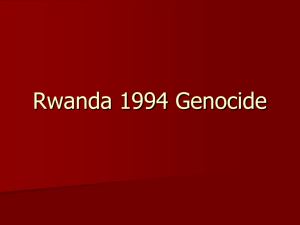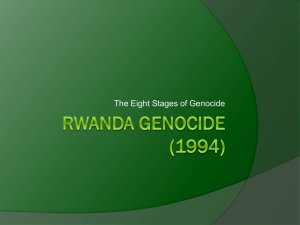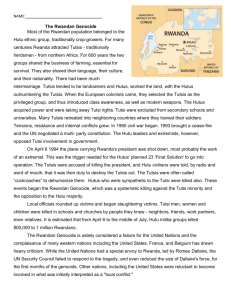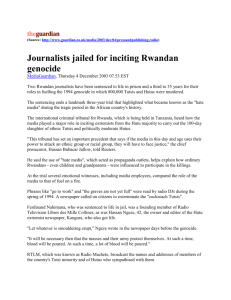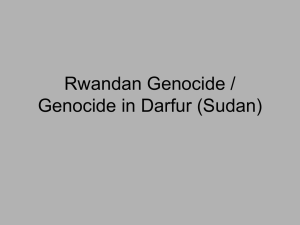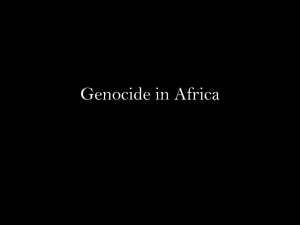Rwandan Genocide
advertisement
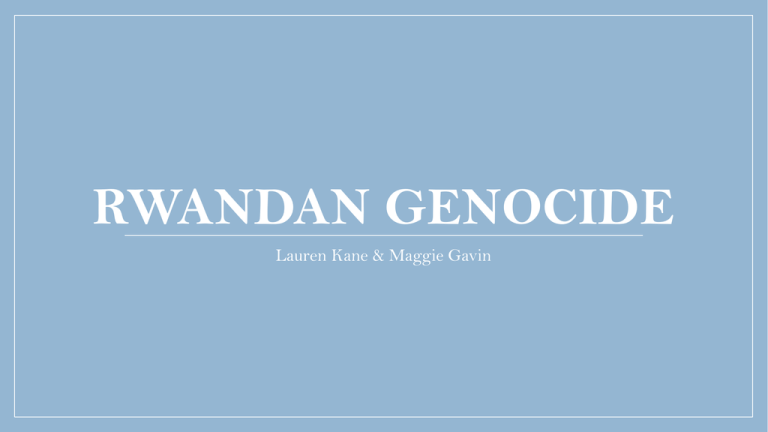
RWANDAN GENOCIDE Lauren Kane & Maggie Gavin Background: Ethnic Tensions • Mostly agricultural economy • One of the highest population densities in Africa • • 85% is Hutu 15% is Tutsi • A pygmy group who were the original inhabitants • Rwanda came under the mandate of Belgium after WWI. The Belgians favored the minority Tutsi over the Hutu. Tension between the two groups created violence even before Rwanda gained its independence. • Hutu revolution in 1959 forced 300,000 Tutsis out of the country. Hutus & Tutsis TUTSI HUTU • Dark Brown skin color • Light Brown skin color • A larger tribe • A smaller tribe • Lower class • Higher class • Religion: Christianity • Cattle-herding warrior’s • Shorter • Religion: Christianity • Shy • Liked the military • Taller Causes of the Rwandan Genocide • Ongoing ethnical tensions between the Tutsis and the Hutus • Belgian Colonial Rule- gave the Tutsi a Western education but denied political & economic power to the Hutu • Rwandan Independence (1963)- Tutsis were discriminated against and exiled to Uganda • Civil War when Tutsis returned in 1990 • April 6, 1994- plane carrying the presidents of Rwanda (Juvenal Habyarimana) and Burundi (Cyprian Ntayamira ) was shot down over Rwanda’s capital, Kigali, leaving no survivors. Genocide • Immediately after the plane crash, the Presidential guard, the Rwandan armed forces, and Hutu militia groups began to set up roadblocks and barricades. They began the mass murder of the Tutsis and moderate Hutus. • First victims: moderate Hutu Prime Minster Agathe Uwilingiyimana and her 10 Belgian bodyguards Genocide (cont.) • The killings quickly spread to the rest of the county. • • • 800,000 people were slaughtered over a three month period. Also during this period, both local and government radio stations called for civilians to murder their neighbors, also referred to as “hate radio” After the RPF captured Kigali and the government collapsed around two million Hutus went to Zaire now known as Congo • • Most people who survived children and/or spouses either died or had contracted HIV Some of the victims suffered from psychological problems later from the events that went on from April to July. Aftermath of the Genocide • Mass murder of 75% of the Tutsi population • Close to 9% of the adult population is HIV positive • The Tutsis ran the government in by 1997 • United Nations Security Council established the International Criminal Tribunal for Rwanda • • Prosecution of the people responsible for genocide and other serious violations of international humanitarian law committed in Rwanda in the year 1994. Children are having trouble trusting the world again after everything they have seen Timeline • Nov. 1884- Rwanda is assigned to Germany as a part of German East Africa • • Oct. 1924- Belgium if granted League of Nations mandate to govern Rwanda • • They ruled indirectly through Tutsi kings Nov. 1958- Hutu uprising • • Tutsi chiefs maintained power over the Hutu Tutsi had always been favored over the Hutus, and the Hutus rebelled against the Belgian power and the Tutsi kings caused over 100,000 Tutsis to flee July 1, 1962- Rwanda gains independence • Monarchy was abolished and a republic was announced Timeline (cont.) • Sept. 1962- Rwanda is admitted as a UN Member State • Dec. 1963- Massacres of Tutsis Around 20,000 Tutsis were killed in response to a military attack by exiled Tutsis from Burundi • Caused more refugees to leave the country (half the Tutsi pop. was living outside of Rwanda) • • Jan. 1990- Rwandan army begins to train/arm civilian militias • • Oct. 1990- RPF invades Rwanda • • Thousands of Tutsis were killed in massacres around the country All Tutsis outside of the country were thought to be involved April 1994- Plane carrying Presidents of Burundi and Rwanda is shot down in Kigali, killing all aboard Timeline (cont.) • April 7, 1994- Rwanda’s Prime Minister and 10 UN peacekeepers are killed – start of genocide • April 21, 1994- UN peacekeeping forces are reduced • June 22, 1994- UN Security Council authorizes “Operation Turquoise” • UN Security Council Led by French forces • July 19, 1994- RPF gains control of the country – end of the genocide • Nov. 8, 1994- International Criminal Tribunal for Rwanda is established Recovery: A New Rwanda • Working to create a new Rwanda based on shared ideas of the past • Rather than restore society to what it was before the genocide, the government wants to build something new • • One people, one country, open to all Rwandans regardless of ethnic identity New Rwanda is being shaped by western culture and China’s economic influence Pledge to Awareness We pledge to raise awareness and work to prevent further genocides from occurring. Works Cited • http://www.history.com/topics/rwandan-genocide • http://unictr.unmict.org/en/genocide#timeline • http://www.rwandanstories.org/origins/real_differences.html • http://www.bbc.com/news/world-africa-13431486 • http://www.ushmm.org/confront-genocide/cases/rwanda/rwanda-aftermath • https://sites.google.com/site/stanleystherwandangenocide/causes-and-effects • http://www.ehow.com/list_7418133_physical-skin-tone-hutus-tutsis.html • http://www.everyculture.com/wc/Brazil-to-Congo-Republic-of/Tutsi.html • http://www.everyculture.com/wc/Rwanda-to-Syria/Hutu.html • https://historicalfilms.wikispaces.com/Differences+Between+Hutu+and+Tutsi
